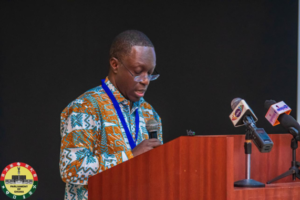By Rashidatu IBRAHIM
Parliament has held a workshop to familiarise members of the Parliamentary Press Corps (PPC) with the updated Standing Orders of the House.
The two-day workshop, held over the weekend in Ada, aimed to acquaint the press with the new orders and equip them with the necessary knowledge to accurately convey information to the public.
During his keynote address at the event, Speaker of Parliament Alban Sumana Kingsford Bagbin underscored the crucial role of the media in promoting good governance and enhancing democracy.
The training, he noted, marks a significant advancement toward creating a more transparent, accountable and participatory legislative environment in Ghana.
“For Members of Parliament together with the parliamentary community, the press is a critical partner in transacting parliamentary business, which is the business of the people,” he said, pointing to the media’s essential role in bridging the gap between the government and its citizens.
“There is a yawning gap between the representatives and the people; and that gap can only be linked and closed by a very important group of people or a very important institution referred to as media, both traditional and new media,” he further noted.
The speaker indicated that by bridging the communication gap and ensuring journalists are well-versed in parliamentary processes, the initiative is positioned to facilitate a legislative process that is more accessible and engaging for Ghanaians.
“So time and practice have exposed gaps and usages in the old Standing Orders, which were detected as far back as 2001,” he added and underscored the critical nature of adapting to new processes and procedures,” the speaker further said.
The revised orders, adopted by a House Resolution on Thursday, December 21, 2023 and in effect since January 2, 2024, introduce new practices and procedures. These include reciting the National Pledge, conducting parliamentary business via virtual platforms, and clearly outlining the hierarchy of Parliament’s leadership.
During his welcome speech at the orientation workshop, Cyril Kwabena Oteng Nsiah, the Clerk to Parliament, stressed the vital role of the media in fostering parliamentary democracy. He urged members of the Parliamentary Press Corps to offer comprehensive and accurate coverage of Parliament.
“As partners in the advancement of parliamentary democracy, the critical role of the media in the reportage of parliamentary proceedings, as well as facilitating the scrutiny of activities of the representatives of the people cannot be overemphasised. Indeed, the work of Parliament in our governance architecture could only be well understood and appreciated by the citizenry through the dissemination of relevant information pertaining to the mandate, procedures and the conduct of business of the House.

“This orientation programme, therefore, affords members of the Parliamentary Press Corps the opportunity to familiarise yourselves with the contents of the revised Standing Orders to enable you report accurately not only on the proceedings and other activities of Parliament, but also the intricate practices and procedures that underpin certain decisions, motions and resolutions of the House,” the Clerk noted.
Commenting further, Mr. Nsiah explained the rationale for a revised set of laws and procedures for the Legislature.
He highlighted contemporary challenges, such as increased calls for transparency in the democratic process and the impact of the COVID-19 pandemic, which exposed deficiencies in the House’s procedures, underscoring the necessity for adopting innovative techniques and strategies to address these issues.
“Parliaments of the Fourth Republic have, in consonance with the provisions of article 110 of the 1992 Constitution, regulated procedures of the House by Standing Orders, which prescribe the rules and practices for the conduct of parliamentary business.
“After 23 years of adherence to the provisions of the previous Standing Orders of the House with minimal amendments, it is prudent that Parliament refines its processes and procedures in accordance with emerging legislative trends across the Commonwealth.
“Moreover, the hung nature of the Eighth Parliament, which is the first of its kind since the inception of the Fourth Republic, presents a number of novel situations and challenges that were not within the contemplation of the drafters of previous Orders of the House,” he further noted.










